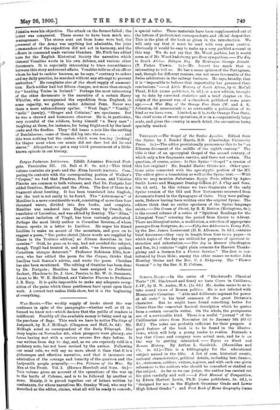Corpus Poetarum Latinorunt. Edidit Johannes Percival Post. gate. Fasciculus III.
(G. Bell et F. 9s. net.)—This third volume contains six poets and the /Etna Incerti Auctoris. Cora. paring its contents with the corresponding portion of Walker's "Corpus," we 6nd that Phredrus, Persius, Lucan, and Valerius Flamm are common to both volumes, and that Dr. Postgate has added Grattius, Manilius, and the ./Etna. The first of these is a fragment about hunting. It has been translated into English, but the text is not easily to be found. The "Astronomica" of Manilius is a more considerable work, consisting of more than four thousand verses, divided into five books, and complete. Manilius was rendered into English verse by Creech, the translator of Lucretius, and was edited by Bentley. The "/Etna," an evident imitation of Virgil, has been variously attributed. Perhaps the most likely author is Cornelius Severus, of whom Seneca speaks in a letter to Lucilius. He urges his friend Lucilius to make an ascent of the mountain, and goes on to suggest a poem, "Nee pudor obstet [these words are supplied by Haase in the Tenbner edition] no /Etnam describes in tuo carmine." Ovid, he goes on to say, had not avoided the subject, though Virgil had treated it, and adds, " ne Severum quidem Cornelinm uterque deterruit." Professor Robinson Ellis, how- ever, who has edited the poem for the Corpus, thinks that Lucilius took Seneca's advice, and wrote the poem. Claudian has also been mentioned. The editing of Grattius has been done by Dr. Postgate ; Mannino has been assigned to Professor Heckert, Plitedrus to Dr. J. Gow, Persius to Mr. W. G. Summers, Lama to Mr. W. E. Heitland, and Valerius Flaccus to Professor J. B. Bury. It is quite impossible to make any adequate recog- nition of the pains which these gentlemen have spent upon their work. I correct text makes little show, but it is the beginning of everything.






































 Previous page
Previous page